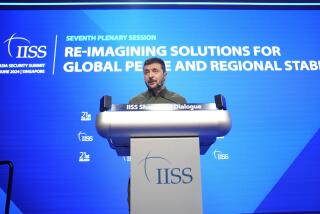In Praise of Advancing the Cause of Peace
Itās a most improbable trio for peace, to be sure. Yet in the last week, three world leaders have responded in hopeful ways to their grave responsibilities to make the world, especially Asia, a safer place. The first two leaders represent democracies, but the third does not. Yet President Jiang Zemin appears to be trying to work with Taiwan President Chen Shui-bian and President Clinton for greater peace and stability. If this admittedly optimistic reading of their three diplomacies is correct, then world politics may be nearing a historic turning point.
The first word of praise goes to Clinton, his integrity battered immeasurably in recent years by everything from arguably silly morals charges to arguably serious campaign-contribution allegations. Yet, over the last two months, he has battled tirelessly and even bravely in this election year on behalf of the China trade bill. This uphill, all-out effort was always the right thing for the president of the United States to support. Never mind the conspicuously self-interested cheerleading of multinational corporations, which turns so many Americans off. A rulerās job is first to enhance the peopleās peace and security, and every new significant economic or political entanglement we create for China has the potential to bind it ever more firmly into a new world order of peace, international process and political predictability. In fact, the administrationās proper push for permanent trading status is not only a politically moral position but, in fact, the only true ethical one.
Yes, that observation will anger Americans understandably offended by Chinaās poor political-rights record. Alas, many regimes, such as U.S. ally Saudi Arabia, perform as poorly as China in this regard. Let us at least grant China overdue recognition of its absolutely extraordinary and unprecedented economic climb out of Maoās misery that has raised more of its people out of poverty more quickly than any government in recorded history. To be able to eat and be clothed is a human right too.
To be sure, Clinton was reluctant to take the high moral ground on the China issue; he wasnāt always prepared to fight. In fact, earlier this year, he was even considering cutting and running--or at least downsizing his political exposure. He feared the collateral damage to Vice President Al Goreās chances against Texas Gov. George W. Bush if the administration were to openly fight organized labor, which is largely opposed to the permanent normal trade relations bill. But clearer minds prevailed, especially that of Commerce Secretary William Daley. He steered the president away from one of his patented retreats, and, by March, Clinton was where any worthy U.S. president ought to be on the issue, saying that supporting Chinaās entry ārepresents the most significant opportunity that we have had to create positive change since the 1970s, when President Nixon first went there.ā
Leadership sometimes means just saying no to core constituencies, as Clinton has now done. So, too, did Chen Shui-bian. Over the weekend, in his inaugural address, the former advocate of independence for Taiwan took a statesmanlike position. He did not pander to his political partyās core constituency that favors a formal, in-your-face separation from Beijing, fearing the disruptive effect on East Asian stability and Taiwanās own security. Instead, in a tremendous, historic speech, Chen pointed across the Taiwan Strait to the Chinese mainland and said: āUnder the leadership of Mr. Deng Xiaoping and Mr. Jiang Zemin, the mainland has created a miracle of economic openness.ā He asked: Why canāt the two great Chinese peoples on the mainland and Taiwan somehow work out peacefully āthe question of a future āone Chinaā ā? Said the former human-rights lawyer: āThe history of the 20th century left us with a major lesson--that war is a failure of humanity. Waged for whatever purpose or whatever imperious reason, war is the greatest harm to freedom, democracy and human rights.ā
It was an address designed to respect, rather than to insult, Beijingās policy of āone China,ā yet without selling Taiwanās people down the river. And, so far at least, the carefully crafted effort looks to have worked: Chinaās official reaction, though dutifully critical of Chenās failure to accept the āone Chinaā principle unconditionally, was, by the shrill standards of Beijingās usual line on Taiwan, scarcely shy of subtle praise.
For this, a signal must have come from the top to low-key the response and tender the new president of Taiwan more time, some room for maneuver and respect. This would at least logically follow from Beijingās new stance on the cross-strait issue, revealed in this column three weeks ago by Wang Daohan, whose responses to our written questions are known to have been cleared by the all-powerful Central Committee in Beijing. Wang, president of Chinaās Assn. for Relations Across the Taiwan Straits, called for some tolerance on both sides and avoided the martial toughness of earlier Chinese comment on the Taiwanese elections.
Jiang appears to have accepted Chenās speech for what it clearly was: an honest attempt to avoid a blowup on the explosive unification issue by threading a tricky diplomatic needle. In his poised, wisely minimalist reaction, Chinaās president too may be showing that he shares a larger vision of peace and stability. Chenās speech and the mainlandās official response may not yet add up to a major diplomatic breakthrough. Yet the seeds for progress have been sown. These must be watered with warmth from the West, not nipped in the bud by ideological frost.
Times contributing editor Tom Plateās column runs Wednesdays. E-mail: [email protected].
More to Read
Sign up for Essential California
The most important California stories and recommendations in your inbox every morning.
You may occasionally receive promotional content from the Los Angeles Times.










